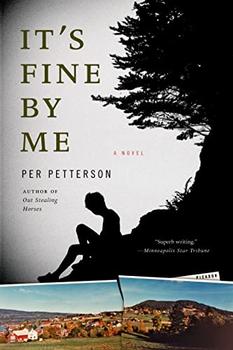Reading Guide Questions

Please be aware that this discussion guide will contain spoilers!
- Early on in the novel, Audun explains that he wears sunglasses because bright light makes him sick. How did this affect your reading of what followed? Why do you think Petterson opens his book by immediately calling into question his narrator's reliability?
- While hiding behind his sunglasses and avoiding close emotional connection with others, Audun still seems to care deeply about being trendy—dressing in the latest fashions, listening to the coolest bands. Do you think this paradox rings true of adolescence? What about in adulthood? Ultimately what do you think drives Audun more: his desire to fit in, or to be apart?
- Discuss Petterson's use of the forest as a metaphor. To Audun it's often a refuge, especially when he is young and imagined himself the Native American friend of Davy Crockett. "As soon as I was on my own, I was Wata," he remembers. "Inside our room, I stood by the window gazing out at the dark edge of the forest, longing to be there." When he gets older, however, Audun is drawn to Jack London's stories about the dangers of the natural world, and discovers that as easily as it can provide refuge for him, it also hides his father. In fact, when he first sees his father, he "raises his hand as if to salute me, like an Indian would."
- Like Holden Caulfield, Audun scorns the adult world: "They are old, their days are over," he says. "Scraping their feet against the ground, letting the clock tick them closer to their first gulp." Why do you think Audun then leaves school to join the very crowd he despises, becoming a blue-collar factory worker? Does some part of him find solace in the crowd?
- Compare and contrast Audun and Arvid in terms of their reading tastes. While Arvid is drawn to revolutionary pamphlets, Audun prefers more contemplative, emotional literature, like London's Martin Eden—books Arvid dismisses as "purple." How does what they read reflect, or contradict, their personalities?
- As the book jumps back and forth between Audun as a thirteen-year-old and Audun as an eighteen-year-old, were you able to easily tell the difference? In what ways? How much did he change in those five years?
- Have you gotten to know Audun more deeply by the end, or does he still seem hidden behind those sunglasses?
- Audun reads voraciously and even works in the world of words, as a newspaper boy and, later, as a printer. He wants to be a writer, but never commits. What keeps him from fully embracing this interest?
- What did you make of Audun's vision of life in America? "There is something about those people," he says. "They are for real." What things define the American lifestyle for him? Did Petterson's description of Norway seem similar or different to life in the United States? In what ways?
- When Audun confronts Dole for beating up Arvid's father, he says, "I don't know why I did what I did, but I don't think it was for his sake." For whose sake was it?
- Audun suffers two significant experiences of destruction and rebirth, first after falling into a pool and being taken in by Leif and Signe, and later after fighting Dole and being rescued by Abrahamsen. How do these experiences change him?
- Audun tries to emulate Hemingway, one of his idols: "I light the cigarette and try to do what he did: write one true sentence." Do you think he succeeds? Does the book feel true, or what Arvid would call "purple"? Can it be both?
- At the end of the book, remarking on his rough, cracked hands and skin from working at the printing press, Audun admits that "There is a change I have been waiting for that doesn't happen." Do you think Audun has or hasn't changed by the end of the novel? In what ways? What change do you think he wishes has occurred?
Unless otherwise stated, this discussion guide is reprinted with the permission of Picador.
Any page references refer to a USA edition of the book, usually the trade paperback version, and may vary in other editions.

 Book Reviewed by:
Book Reviewed by:



